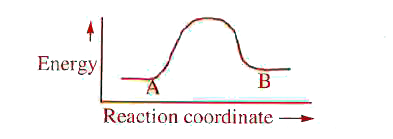If the rate for the chemical reaction is expresssed at Rate =K[A][B]" thenSolution in Telugu
order of reaction is one
order of reaction is n
order of reaction is 1+n
order of reaction is 1−n
The correct Answer is:C
Step by step video, text & image solution for If the rate for the chemical reaction is expresssed at Rate =K[A][B]" then by Chemistry experts to help you in doubts & scoring excellent marks in Class 12 exams.
Topper's Solved these Questions
- BOOK - AAKASH SERIESCHAPTER - CHEMICAL KINETICSEXERCISE - OBJECTIVE EXERCISE - 2 (Reaction rates and influencing factors)15videos
CHEMICAL KINETICS
- BOOK - AAKASH SERIESCHAPTER - CHEMICAL KINETICSEXERCISE - OBJECTIVE EXERCISE - 2 (Collision theory)2videos
CHEMICAL KINETICS
- BOOK - AAKASH SERIESCHAPTER - CHEMICAL KINETICSEXERCISE - OBJECTIVE EXERCISE - 1 (Collision theory)14videos
CHEMICAL KINETICS
- BOOK - AAKASH SERIESCHAPTER - CHEMICAL KINETCSEXERCISE - EXERCISE - 3.245videos
CHEMICAL KINETCS
- BOOK - AAKASH SERIESCHAPTER - CHEMICAL THERMODYNAMICSEXERCISE - Additional Practice Exercise54videos
CHEMICAL THERMODYNAMICS
Similar Questions
Consider the following reaction N2(g)+3H2(g)→2NH3(g). The rate of the reaction in terms in terms of N2 at T(k) is −d[N2]dt=0.02 mole lit−1sec−1. What is the value of −d[H2]dt (in mole lit−1sec−1) at the same temperature?
02:03View SolutionThe minimum energy required for molecules to enter into chemical reactionn is called
01:33View SolutionFor a reversible reaction, A⇔B, which one of the following statements is wrong from given energy profile diagram ?
 02:29View Solution
02:29View SolutionDiscuss on the kinetic spontaneity of a chemical reaction. Is a slow reaction spontaneous? Why?
01:28View SolutionWhich among the following is not an exact differential?
02:20View SolutionRate law for a chemical reactions is :
Rate =k[A]1/2[B]1
Choose the correct options among the following :View SolutionIf the rate of reaction between A and B is given by rate =k[A][B]^(2) , then the reaction is :
04:21View SolutionThe rate law for the reaction below is given by the expresssion K[A][B] . A+B to product If the concentration of B is increased from 0.1 to 0.3 mole, keeping the value of A at 0.1, mole the rate constant will be :
01:55View SolutionFor a chemical reaction rate law is, rate =k{A]2[B]. If [A] is doubled at constant [B], the rate of reaction
01:30View Solutionif the rate of reaction between A and B is given by rate =k[A] [B^(n)] then the reaction is
04:21View SolutionIf the rate expresson for a chemical reaction is Rate=k[A][B]n then
View Solutionएक रासायनिक अभिक्रिया की दर अभिव्यक्ति निम्न प्रकार है: Rate =k[A]m[B]n, तो-
04:21View SolutionIf the rate expression for a chemical reaction is given by Rate =K[A]n[B]n
00:58View SolutionA chemical reaction has the rate expression Rate = K[A]^(2)[B] . What is its overall order?
04:25View Solutionएक रासायनिक अभिक्रिया की दर अभिव्यक्ति निम्न प्रकार है: Rate =k[A]m[B]n, तो-
02:53View SolutionIf the rate of reaction between A and B is given by rate =k[A][B]^(2) , then the reaction is
02:53View Solution

